Permissive Parenting Style Meaning Diana Baumrind Was A Developmental Psychologist Who Conducted A Study On The Parenting Styles.
Permissive Parenting Style Meaning. Expectations Are High With Limited Flexibility.
SELAMAT MEMBACA!
Permissive parenting is sometimes known as indulgent parenting.
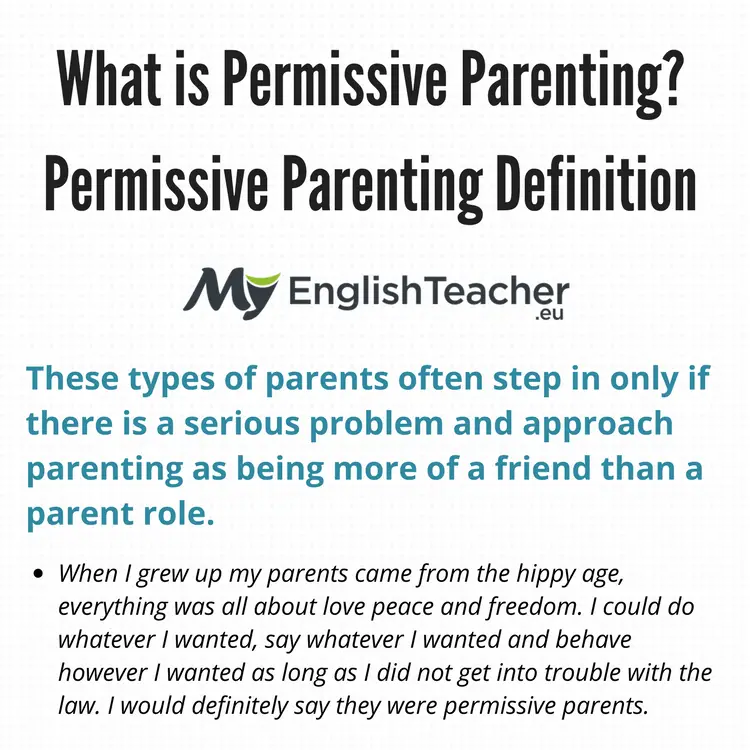
This can be difficult at times, because it often means becoming stricter, enforcing rules, and being able to cope with your child being upset.
Permissive parenting, also known as indulgent parenting, is a parenting style characterized by high responsiveness and low demandingness.
Permissive parents are very responsive to the child's emotional needs.
/2794957-what-is-permissive-parenting-5b2c035943a103003654116b.png)
Permissive parents are highly responsive towards their children's needs and nurture their talents and personality.
But they are least demanding because they have low expectations on children may love permissive parenting style as it gives them the maximum freedom without any strings attached.
A parenting style is a psychological construct representing standard strategies that parents use in their child rearing.

The permissive parenting style is an extremely relaxed approach where parents are generally warm, nurturing and affectionate.
They often use bribery as a means of controlling their children.
Treats, toys, or gifts are provided as a discipline approach.
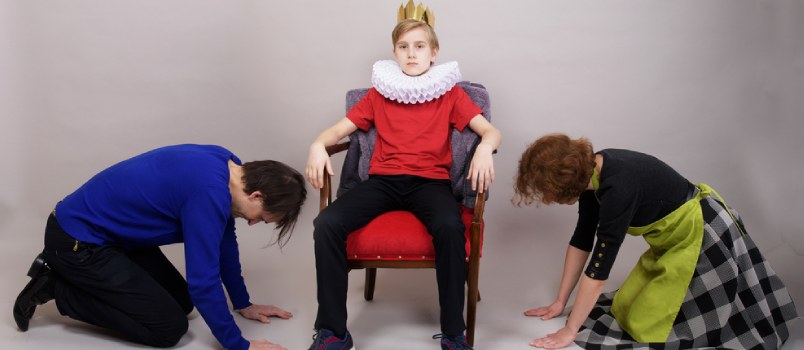
Permissive parenting is accommodating parenting (sometimes even referred to as indulgent parenting).
While permissive parents are often very responsive and loving, this parenting style is defined by having no rules.
The term was developed by psychologist diana baumrind, who studied preschoolers and found their parents mostly fit into three parenting styles:
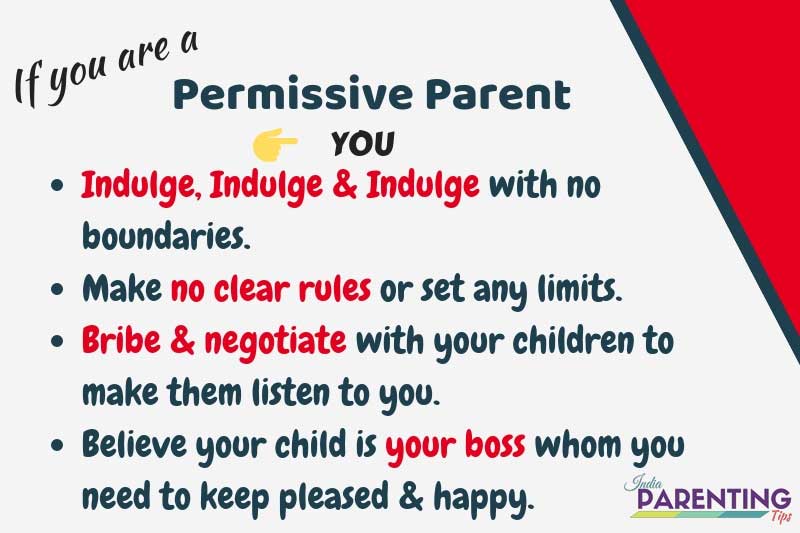
Use any means necessary to obtain compliance, such as bribery.
Allow children to manipulate them to get what they want, or allow children to play one parent against the other.
This article about the permissive parenting style is based on research published before july 2019.
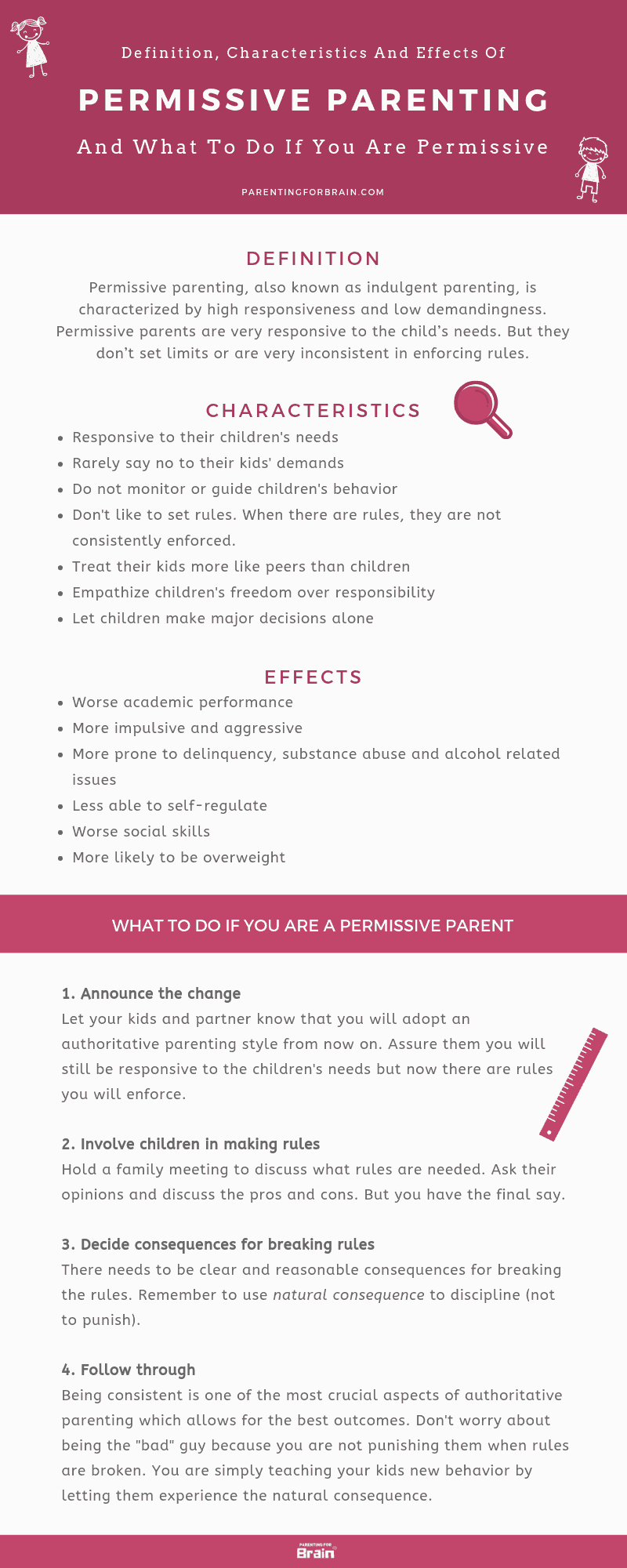
Permissive could mean different things, but in my opinion involves allowing kids to do and see things that may or may not be safe or age appropriate.
What do you mean parenting style?
The speaker talked about different parenting styles people use with their kids.

My parents definitely followed a permissive parenting approach, i guess that is why i might be more authoritative.
Parents with this style are typically less nurturing.
Expectations are high with limited flexibility.

Effects of permissive parenting style.
Permissive parents usually take on more of a friend role than a parent role.
They often encourage their children to talk with them about their problems, but they usually don't put much effort into discouraging poor.
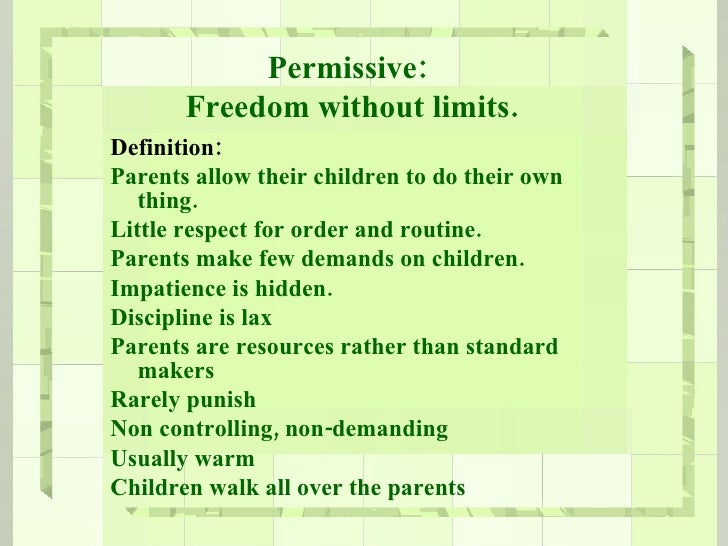
Taking diana baumrind's definition a step further by understanding the psychological fears of permissive confusion reigns when defining 'what is permissive parenting?' trying to find a universally applicable definition of permissiveness in.
Some permissive parents believe that by allowing their children free reign they will encourage their creativity.
While these positive effects of permissive parenting will propel you to consider this style of permissive parenting often means that a child does not learn at an early age the basic principle.
Parents adopt a very friendly parenting approach in this kind of parenting style, and they often do not expect their children to act or behave in a mature manner.
However, this doesn't mean permissive parents don't support their child.
If there's ever a serious issue, the parent will always step in this parenting style isn't always intentional — the parent could be struggling with many other issues which inadvertently means the child becomes a secondary priority.
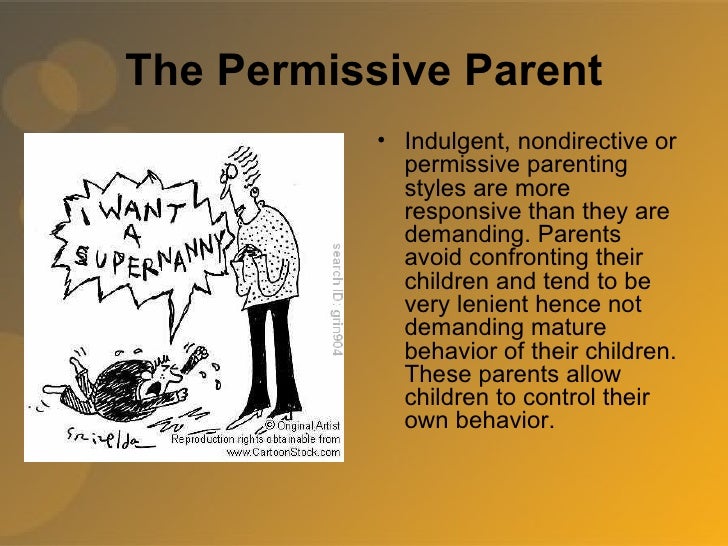
It means that you are aware that this might not be the best thing for them but want to avoid making them unhappy and upset.
Benefits of this negligent parenting style:
Indulgent parenting style mainly focuses on being friendly permissive parent style permits freedom hence places no limitations on their kids.

Seem more like a friend than a parent, standards of behaviour and rules, if any, are often very inconsistent.
There are a number of parenting styles but there is no particular parenting style that can be said to work for every child and parent.
These styles are generally based on the amount of support parents provide and the amount of control they try to exert.

Being permissive with a baby might mean not setting feeding or sleep schedules.
Once kids reach the toddler or preschooler stage.
Permissive parenting is a style of parenting where parents typically want to be viewed by their kids as a 'buddy' rather than a parent.

A permissive parent will deal with power struggles more often than the other parenting styles.
With a focus on the relationship, meaning the permissive parent is more focused on a friendship with their child by giving into their every desire, the child raised in this environment will learn to give to others.
The permissive parenting style is similar to uninvolved parenting only because it allows the child to do being an authoritative parent means addressing your child's needs and having positive the permissive style of parenting has many drawbacks.
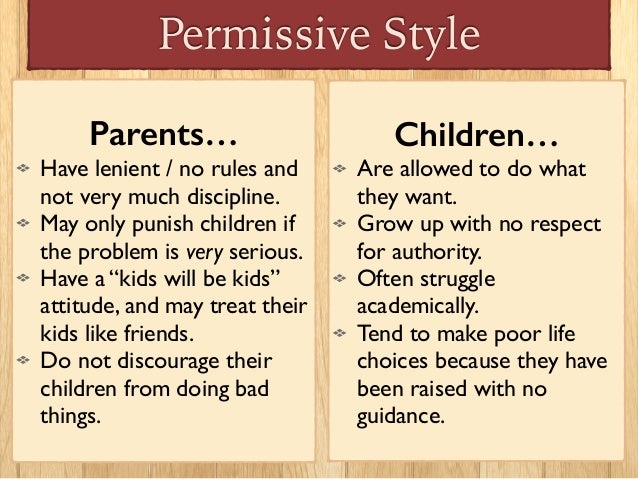
In a nutshell, permissive parents tend to be more like a friend than a parent.
They are very loving, and they care for their children.
However they don't discipline them, or make them learn about responsibility.
/1095045-article-types-of-parenting-styles-5a7cb6aaa18d9e00362ef5eb.png)
Interventions for parents with a permissive parenting style would probably be more effective when the intervention was focused on changing the parental habits.
They also note that children are more likely to drop out if parents employ a permissive parenting style.
Permissive parents encourage high levels of creativity.

That might mean moving across the country to.
So permissive parenting sabotages her ability to achieve in life.
The child never learns that happiness is not derived from wish fulfillment.

Kids want limits because they want someone to be in charge.
What permissive parents don't realize is that parents are not necessarily supposed to be 'friends' with their kids, and that having parents who express their love by respecting their children's preferences and opinions but also clearly communicating and setting boundaries often makes for happier children in.
6 Khasiat Cengkih, Yang Terakhir Bikin HebohIni Manfaat Seledri Bagi Kesehatan5 Manfaat Meredam Kaki Di Air EsTernyata Mudah Kaget Tanda Gangguan MentalResep Alami Lawan Demam AnakIni Cara Benar Cegah HipersomniaMengusir Komedo Membandel - Bagian 2Vitalitas Pria, Cukup Bawang Putih SajaTernyata Jangan Sering Mandikan BayiTernyata Ini Beda Basil Dan Kemangi!!Kids want limits because they want someone to be in charge. Permissive Parenting Style Meaning. What permissive parents don't realize is that parents are not necessarily supposed to be 'friends' with their kids, and that having parents who express their love by respecting their children's preferences and opinions but also clearly communicating and setting boundaries often makes for happier children in.
Uninvolved parenting, sometimes referred to as neglectful parenting, is a style characterized by a lack of responsiveness to a child's needs.

Children of uninvolved parents receive little nurturing or guidance from their parents.
They are practically left to raise themselves.
Neglectful parenting is a harmful parenting style.
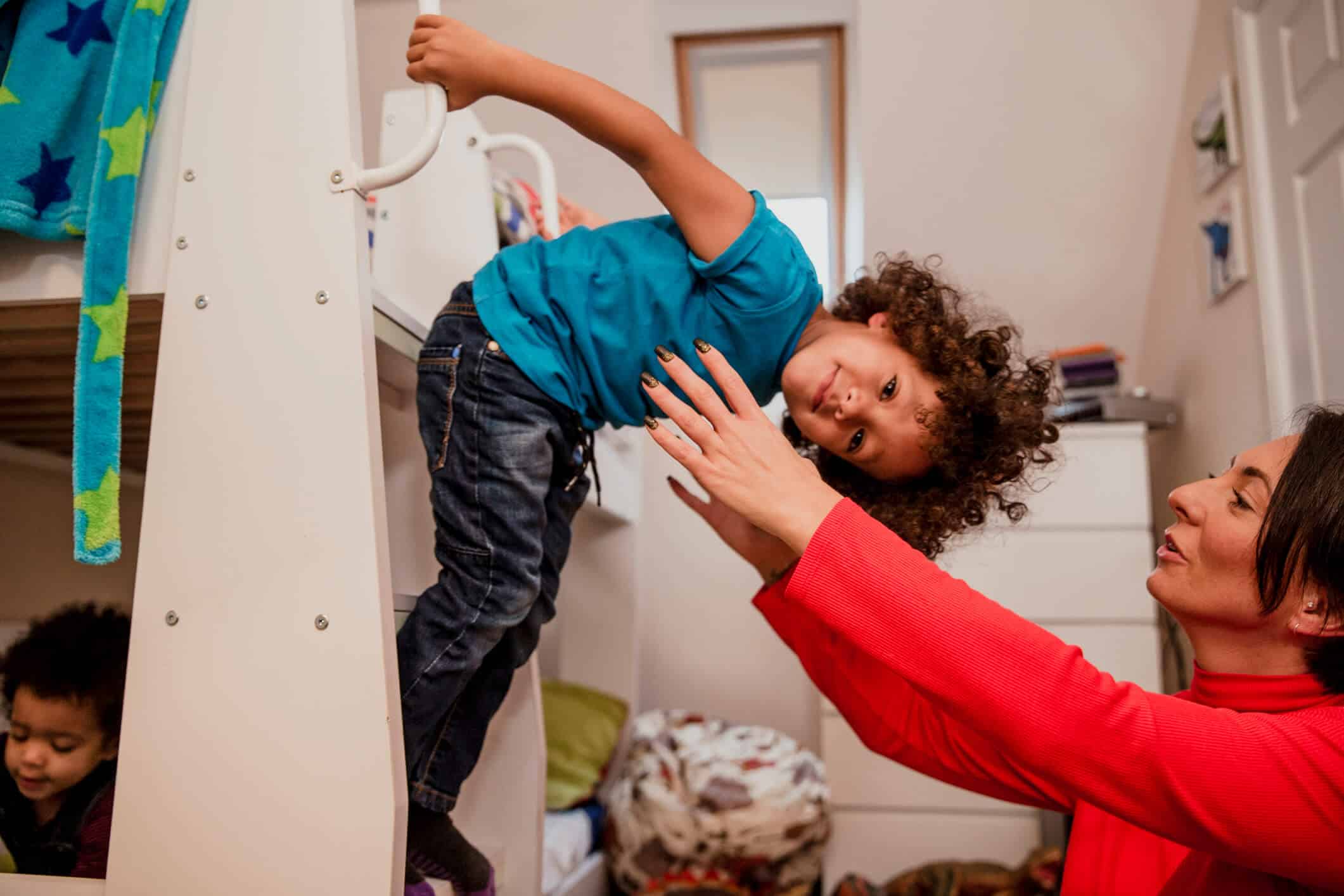
Why do parents adopt neglectful or uninvolved style of parenting?
Researchers attribute uninvolved parenting to several reasons such as financial status, educational background, cultural aspects, and traditional practices.
Here are a few other important reasons for parents to adopt this.

What exactly does the uninvolved parenting style appear to be at a look?
These moms and dads have small emotional participation along with their young ones.
The uninvolved parenting style (often referred to as neglectful parenting) as the name implies, the parent is totally disengaged and emotionally uninvolved in their child's life.
Developmental psychologist diana baumrind in her studies based on.
As the name suggests, uninvolved or neglectful parenting is a style of parenting in which parents may have minimal or no involvement in their kid's overall needs.
Uninvolved parenting, sometimes referred to as neglectful parenting, is a style characterized by a lack of responsiveness to a child's needs.

A parenting style is a psychological construct representing standard strategies that parents use in their child rearing.
The quality of parenting can be more essential than the quantity of time spent with.
When considering the definition of each parenting style, it's helpful to examine them under a lens of baumrind's tbh, this is a parenting style that you hopefully don't run across too often in your social circle.
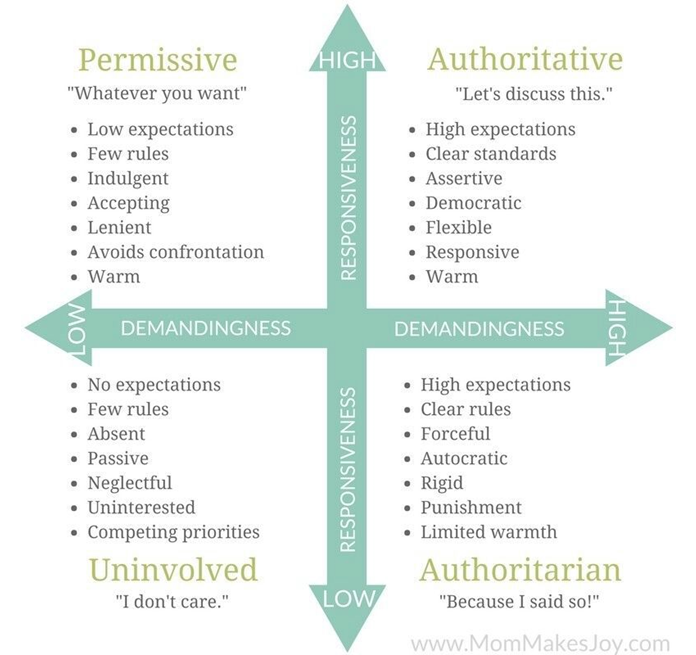
Uninvolved or neglectful parenting style has minimal or no involvement in children's overall requirements.
Parents are least involved in children's physical, emotional and other essential aspects.
A style of parenting is a set of strategies you use to raise your child.
Uninvolved parenting is a parenting style not very famous.
Yet many parents practice it.
Here's everything you need to know about it.

Psychologists describe uninvolved parenting as neglectful parenting.
Therefore, in uninvolved parenting, the parent neglects the child's physical and emotional needs.
This study identifies several parenting styles that affect how children transition from infancy to adulthood.
Neglectful parenting or uninvolved parenting might be the most detrimental type of parenting style.
However, it has also been found that very rarely do parents willingly become neglectful of their children.
In this parenting style, parents are unresponsive, unavailable and rejecting.

The authoritative style of parenting can be described as democratic with parents being willing to discuss options and to negotiate rules and expectations.
What is the uninvolved style of parenting?
Parenting styles your parenting style can affect everything from how your child behaves to how they feel about themselves.

There tend to be few rules.
Uninvolved parents give children a lot of freedom and generally stay out of their way.
Some parents may make a conscious decision to parent in this way, while others are less interested in parenting or unsure of what to do.
Discover which style leads to the best outcomes for kids.
If those statements sound familiar, you might be an uninvolved parent.
Uninvolved parents tend to have little knowledge of what their children are doing.
:max_bytes(150000):strip_icc()/2794956-what-is-authoritative-parenting-5b2c03111d64040037307322.png)
Relating parenting styles and children's temperament.
Definition of terms the following terms are defined for the purpose of this study.
Many parents who use this style of parenting do so because they grew up in adverse environments themselves.

But parents can take steps to ensure that they don't inadvertently adopt such a parenting style.
Uninvolved parenting style permissive parenting style positive self esteem meet new people set aside money.
A parenting style is a way of bringing up your child with a specific approach.

€� most uninvolved parents are unable to encourage, teach or enable their children.
They are often indifferent in their behavior toward their children and lack the knowledge to meet their children's even basic needs.
The influence of parenting style on adolescent competence and substance use.

Attachment parenting, which starts from birth.
From authoritative parenting to authoritarian parenting, here are the most common types of parenting styles the main downside?
Uninvolved parenting can take a lot of different forms — but.

Today parents have different parenting styles to educate their children, so styles that are sometimes not aware that they carry them out.
Years later maccoby and john martin added another style of parenting:
Years later maccoby and john martin added another style of parenting: Permissive Parenting Style Meaning. Any type of parenting style can have consequences for.Foto Di Rumah Makan PadangKhao Neeo, Ketan Mangga Ala ThailandBakwan Jamur Tiram Gurih Dan NikmatIni Beda Asinan Betawi & Asinan Bogor5 Cara Tepat Simpan TelurResep Nikmat Gurih Bakso LeleResep Ponzu, Cocolan Ala JepangSejarah Kedelai Menjadi TahuTernyata Asal Mula Soto Bukan Menggunakan DagingAmpas Kopi Jangan Buang! Ini Manfaatnya
Komentar
Posting Komentar